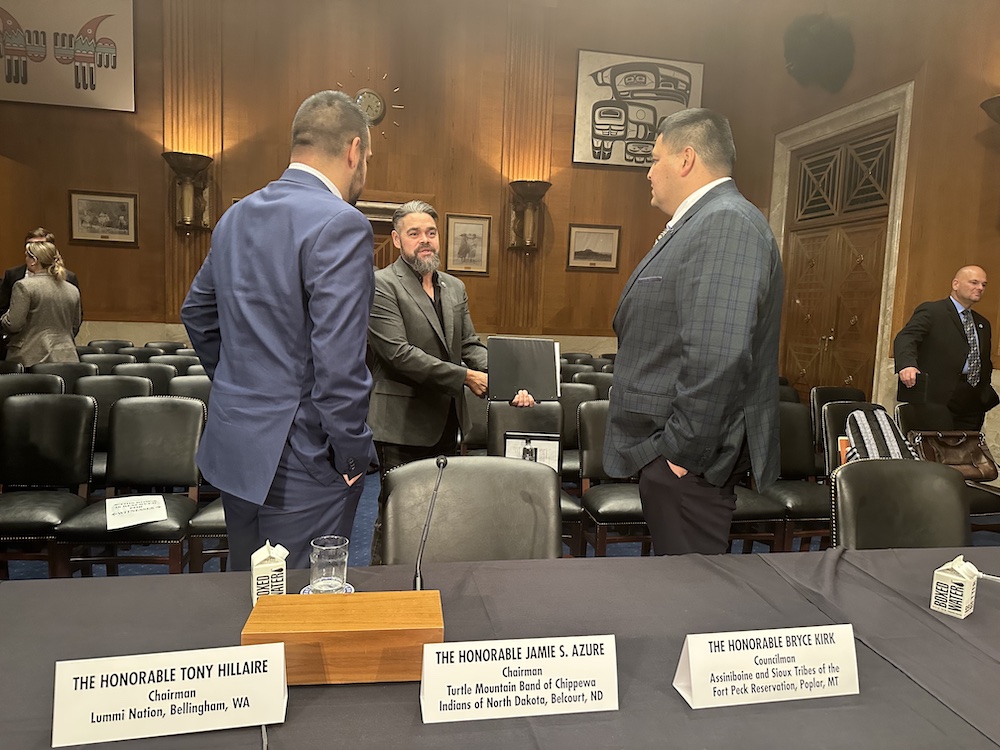
- Details
- By Kunjal Bastola and Shravya Pant, Medill News Service
WASHINGTON – Tribal leaders called on lawmakers to enhance tribal law enforcement authority and implement further behavioral health interventions to address the fentanyl crisis at a Senate oversight hearing on Wednesday.
The hearing held by the Senate Indian Affairs Committee was the first on the issue in more than five years.
[This story originally appeared on Medill News Service and is used with permission.]
In 2021, non-Hispanic American Indians and Alaska Natives experienced the highest rate of opioid overdose deaths among any racial or ethnic population, according to the Centers for Disease Control and Prevention. More than 1,300 Native lives were lost due to overdose that year.
“We are very close at losing a generation to an opioid, to a synthetic drug,” Jamie Azure, chairman of the Turtle Mountain Band of Chippewa Indians of North Dakota, said during his testimony. “We, as tribal leaders, refuse to allow a generation to be lost.”
Throughout the hearing, Indigenous leaders underscored the vulnerability of Native communities to illegal trafficking and the lack of federal support for tribal law enforcement.
Witnesses specifically pushed for the Parity for Tribal Law Enforcement Act. Introduced in July, the bipartisan bill would amend the Indian Law Enforcement Act and authorize tribal officers to be considered federal law enforcement officers capable of enforcing federal law. Tribal leaders argued that such a provision would better enable them to regulate illegal drug trafficking plaguing their communities.
“Without the adequate tribal law enforcement resources, I almost feel like Indian country is being targeted,” Sen. Maria Cantwell (D-Wash.), who co-sponsored the Senate version of the bill, said during the hearing. “People know that you don't have the law enforcement, that you don't have the capabilities, and that's where people are setting up shop.”
Leaders emphasized that tribal communities and their law enforcement agencies are attuned to their own needs, but need more support from federal agencies and the Bureau of Indian Affairs.
Tribal leaders also expressed frustration at the lack of legally recognized authority to prosecute non-Native criminals.
“The lack of tribal jurisdiction over non-Indian drug dealers coming on a reservation undermines our efforts to combat the drug crisis and protect our community,” Tony Hillaire, chairman of the Lummi Nation, said.
Lawmakers and tribal leaders recognized that there is no one-size-fits-all solution to the fentanyl crisis, noting that behavioral health interventions must also be improved. Tribal leaders highlighted the role of intergenerational trauma, arising from a history of colonization and forced relocation, that contributed to the use of opioids in tribal communities.
Senators also heard from tribal medical experts on using traditional cultural practices in the healing process.
“For our community in particular, our folks would much rather see a traditional healer than a Western medical doctor,” said Dr. Aukahi Seabury, a licensed clinical psychologist who leads a non-profit serving medically underserved Native Hawaiian communities. Seabury highlighted racial biases and cultural assumptions that harm the quality of care for Native people.
Lawmakers acknowledged witnesses’ suggestions that health services must integrate traditional healing practices with Western medicine. Research, while still limited, has shown promising results, specifically how sweat lodge ceremonies, smudging, prayers and even drumming ceremonies, when used alongside addiction treatment, can improve outcomes.
“Culture is prevention, and culture is the way of life,” said Dr. Claradina Soto, a behavioral health scientist at the University of Southern California’s Keck School of Medicine.
Committee chair Sen. Brian Schatz (D-Hawaii) said, “Meeting people where they are culturally gets you better medical outcomes.” Schatz asked the committee to finalize a record of relevant studies to help authorize future funding efforts toward culturally mindful care.
Health experts at the hearing also suggested residential treatment programs in counties and tribal communities with higher overdose deaths, medication-assisted treatment such as naloxone and buprenorphine, and sober living programs in traditional housing.
For this fiscal year, the Indian Health Service was allocated $250 million via a congressional supplement. Vice-chair Sen. Lisa Murkowski (R-Alaska) asked witnesses to submit suggestions to the committee for where to allocate this funding.
Tribal leaders shared that while they appreciate the conversation, action is what they are seeking.
“Words are good. Substance is better,” Azure said in an interview with Medill News Service.
Help us defend tribal sovereignty.
At Native News Online, our mission is rooted in telling the stories that strengthen sovereignty and uplift Indigenous voices — not just at year’s end, but every single day.
Because of your generosity last year, we were able to keep our reporters on the ground in tribal communities, at national gatherings and in the halls of Congress — covering the issues that matter most to Indian Country: sovereignty, culture, education, health and economic opportunity.
That support sustained us through a tough year in 2025. Now, as we look to the year ahead, we need your help right now to ensure warrior journalism remains strong — reporting that defends tribal sovereignty, amplifies Native truth, and holds power accountable.
 The stakes couldn't be higher. Your support keeps Native voices heard, Native stories told and Native sovereignty defended.
The stakes couldn't be higher. Your support keeps Native voices heard, Native stories told and Native sovereignty defended.
Stand with Warrior Journalism today.
Levi Rickert (Potawatomi), Editor & Publisher
